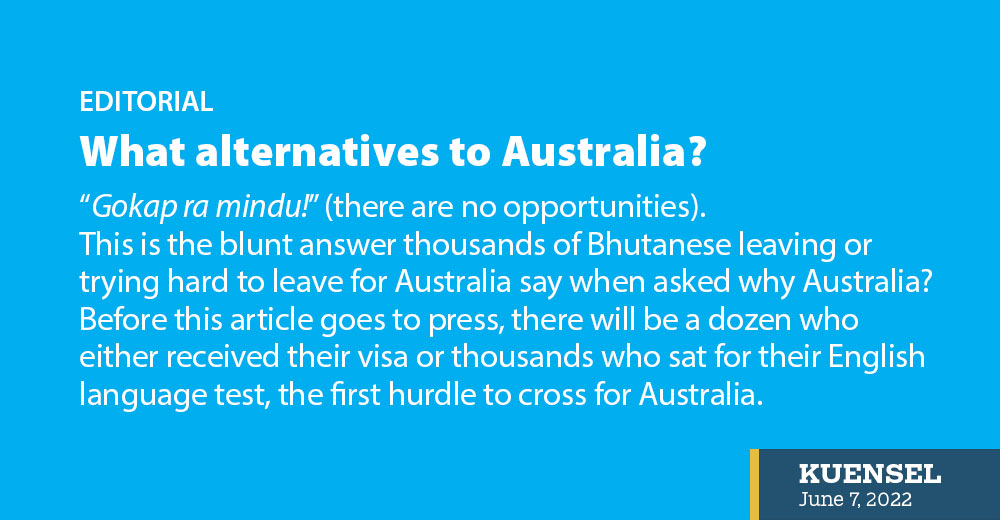“Gokap ra mindu!” (there are no opportunities).
This is the blunt answer thousands of Bhutanese leaving or trying hard to leave for Australia say when asked why Australia? Before this article goes to press, there will be a dozen who either received their visa or thousands who sat for their English language test, the first hurdle to cross for Australia.
The English language test is not difficult to clear for Bhutanese who finished a free English- medium high school or higher secondary school. Hundred others are skilled people who taught English or had secure government jobs. There are no data, but rough estimates indicate that there are 50,000 Bhutanese vying to leave for the southern hemisphere.
The data is as sketchy as the government policy. The government is clear on one thing. Those leaving the country for better opportunities are compared to cattle looking for greener pastures. Australia, with 18 percent of its total landmass as harsh desert is the green pasture. A policy to stop Bhutanese leaving for Australia is not necessary, according to the government. As long as it benefits the government- in terms of easing pressure on unemployment or increasing remittance, it is alright.
We cannot or should not stop people from looking for better opportunities or ‘greener pasture’. If the trend can benefit both Bhutan and the Bhutanese, there is nothing wrong. The government should not stop people looking for better opportunities. As we know, most South Asian countries export labour- skilled and unskilled. The Bhutanese story, too, is encouraging so far.
However, given the number of people leaving, a policy may be necessary. It may not be to stop people leaving, but because of the repercussions it has on those staying back.
It is not only unemployed youth or fresh university graduates leaving for Australia or other countries. There are people in critical posts whose services are indispensable. For instance, an immediate impact would be on our education as teachers, both young and experienced leave for Australia. There are civil servants trained and skilled at the cost of the government and then there are skilled people that Bhutan needs to retain. One school reportedly lost half a dozen teachers to Australia.
Unlike other South Asian countries, the average profile of Bhutanese leaving to work in foreign countries, whether as maids or cleaners, accountants or care givers or even professionals are schooled and trained to develop our human resource capacity. The Australian scholarships awarded to Bhutan is a policy to develop our human resources. It was never intended to lure Bhutanese for odd jobs.
As long as there are no ‘gokaps,’ Bhutanese will leave for Australia or beyond. This we cannot stop. What we have to do is create ‘gokaps’. And this should be a priority of successive governments. We cannot wash our hands off by saying that a cleaner or a care giver in Australia earns as much as a minister in Bhutan.


